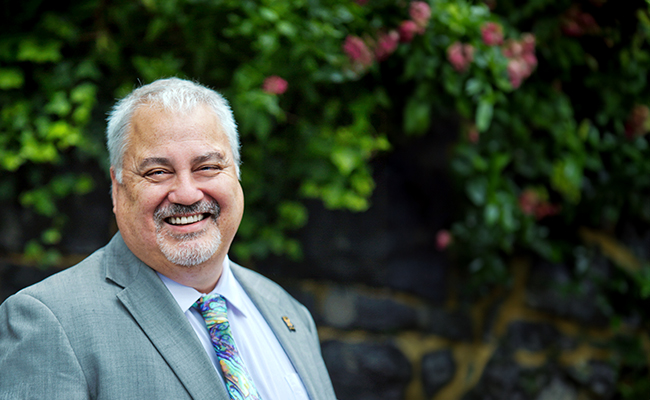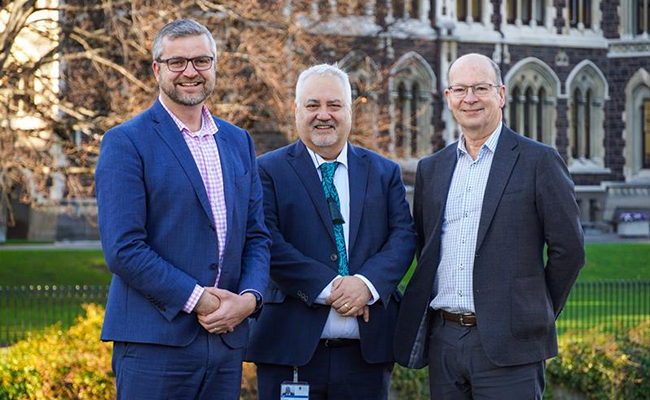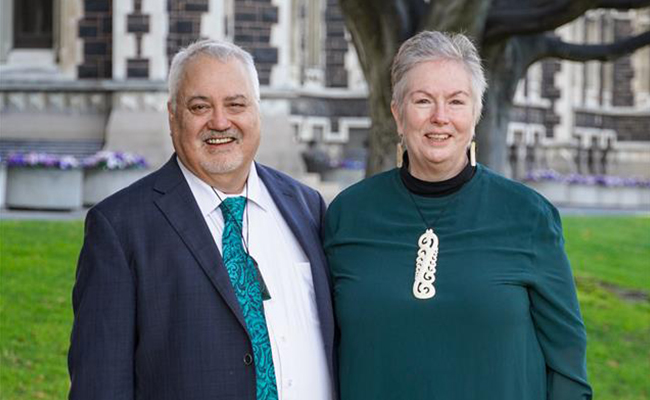Thursday 22 June 2023 3:42pm

He is bringing years of experience to his new role, but Mark Brunton says he will also be guided by the whakataukī (Māori proverb) about humbleness, 'Kāore te kumara e kōrero ana mo tōna ake reka – the kumara does not speak of its own sweetness'. Image background digitally extended.
Mark Brunton's mother was beaten for speaking te reo, now a generation later he will be helping our University form true partnerships with Māori as our Operations Group's Kaitohutohu Rautaki Matua Māori, Senior Strategic Adviser Māori.
Brunton (Ngāi Tahu, Kāti Māmoe, Waitaha) believes his listening skills and being able to talk to anyone will be vital – he will be chatting to many different people to find out what they do, how they do it, what they need from him, and whether changes to processes could or should happen.
He will be reading each area's plans to get alongside their goals, note where the treaty is mentioned, and spot opportunities to help. He thinks his work could also involve buildings, land, and signs, but it is early days.
“One of the really good parts about this role is there's stuff that I know that I know other people don't, so I hope to clarify it for them,” Brunton says.
And he is encouraged by people's “willingness to engage, which is a big thing. That's the only way it can work”.
Brunton started on Friday, after leaving his position as a Manager, IT Advisory on our Dunedin campus.
Fortunate
In a highly competitive market for Māori expertise, Chief Operating Officer Stephen Willis feels incredibly lucky to have recruited someone with such cultural, academic, and interpersonal skills who also has extensive experience of our Operations Group of services – while both studying and working at our University – so knows our community well.
Brunton has an Otago Bachelor of Arts degree in Computer Science and has worked on the Dunedin campus as a programmer/analyst.
He had a break away in 1993 to work for AgResearch, and the Dunedin City Council as inaugural Webmaster, then returned to the University in 2006 to administer the research consultation process as Research Manager Māori under the umbrella of the Office of Māori Development.
While working he earned a Commerce Postgraduate Diploma in Information Science in the late 1980s, then a Master of Indigenous Studies in 2008.
The role
Willis says embedding Māori knowledge, values and language in our planning, day-to-day thinking and mahi (work) will propel our University towards achieving its vision of truly partnering with mana whenua (the Indigenous people of the land).
Brunton's role is a combination of two vacant Māori positions that covered the divisions of Shared Services, Campus Development, and Property Services. Willis decided to combine them and elevate the role to his Senior Leadership Team to provide strategic input and a wide span of influence. Brunton will not be replaced in IT Advisory, given the current financial situation.
In his new position, he will be responsible for leading the group's implementation of the Māori Strategic Framework and coaching its leaders in applying Te Tiriti o Waitangi, rangatiratanga, tikanga, and kaitiakitanga.
Other key tasks include building a Māori staff network, liaising with our Office of Māori Development, and ensuring all campuses partner with mana whenua operationally, Willis says.

With past and present leaders after his mihi whakatau on Friday … Mark Brunton's (centre) new role means he has moved from reporting to Information Technology Services Director Mike Harte to reporting to Chief Operating Officer Stephen Willis.
Culture and upbringing
While Brunton grew up in the Waitaki valleys only a few kilometres from a place his great-great-great-great-grandfather had a fishing camp, his mother did not speak the language at home or teach it to him because of the trauma she suffered being beaten for speaking te reo during the 1920s and 30s.
She was very hesitant about mentioning the culture as well but always told Brunton he had a right to claim his tribal affiliations, so “you always knew who you were. Inside yourself, you know that you belong, and that's important”.
She also felt education was incredibly vital, working “a couple of jobs to put us through school”.
Brunton never lost that value and has “more than 1000 academic points because so many things are so interesting, forensic biology, psychology, all sorts of things.”
Gaining knowledge
When he started at Otago in the 1970s, there “was not very much of a Māori presence – that was demonstrable”. The Māori Centre did not exist, and no Māori groups were officially part of the University.
Even into the 1980s, society was still actively discriminating against Māori, “you would walk into a shop and people would follow you around. I actually got asked to leave one shop because I said I was just browsing”.
But at Otago, leaders always supported Brunton's quest for knowledge so “anything that I ever did along the way has always been with the help of others and I am incredibly grateful for those people. It's not the work of one person, it's the work of a whole lot of people”.
Campus work and research
His first work at Otago was as a Computer Science student, creating a stock control inventory for the Property Services Division (then called Works and Services), “so funnily enough I'm coming full circle and working with those guys again”.
Brunton was also on the team that rewrote the enrolment system used in the 70s and 80s. That took about three months and many long hours, but it worked without a hitch from day one, with that success stemming from a collaboration involving three analysts, academics, and records people.
As Research Manager Māori, he helped provide administration for the research consultation processes, which included speaking to departments and project groups about the processes and why they were important.
“One tenet was only Māori can provide advice about Māori in research and Māori will decide what research is of interest. For example, if it was about diabetes, we would say we are really interested because Māori are more likely to have diabetes, there is a disparity,” he says.
Brunton's thesis involved asking people how they felt about that research consultation process, what they thought was missing, and what worked well – he was triangulating researcher's interest in their career prospects, participants' interests, and the interests of public good.
His research role also involved running our University's Treaty Workshops for 10 years until 2018, introducing more than 2000 people to Te Ao Māori (a Māori world), highlighting the differences between the English and Māori versions of Te Tiriti o Waitangi, what was taken from Māori, and the process of redress that stemmed from the inception of the Waitangi Tribunal and what the Treaty might mean for our University today – “I would regularly get full classes for that”.

On campus and at home … Mark Brunton with life partner Nicola Walmsley, they were both Information Technology Services Managers, IT Advisory until Friday.
In the new job
For his latest role, Brunton jokes, “maybe there's a PhD in it, my mother always wanted me to be a doctor”.
His approach to being a strategic adviser seems similar to being a Manager, IT Advisory, where he liked chatting to people and “if they didn't understand what was going on, if they were having issues with how things were happening, then I went and helped”.
He would work to unravel and resolve concerns “because ultimately, we wanted people to succeed, to get something out of their job, out of their day. Sometimes the wheel had fallen off somewhere and you had to go and figure out which ditch it was lying in so you could put it back on”.
Asked if he expects comments about being a Māori strategic adviser who was not brought up with the language on a marae, Brunton says “you will get challenged but if you're true to tikanga (Māori customs and values) then there's not much you can be challenged on”.
He does not think he is representing all Māori, just as no person can claim to represent their entire ethnicity.
Instead, Brunton will bring his own perspective to the role while also following the whakataukī (Māori proverb) about humbleness, Kāore te kumara e kōrero ana mo tōna ake reka – the kumara does not speak of its own sweetness, because his views will not always dominate as he seeks guidance from peers, elders and tipuna (ancestors) when appropriate.
Brunton is looking forward to his new role because, “for a long, long time we didn't have the opportunity to say who we are and now I think it's important we do”.
At his mihi whakatau Brunton shared this whakataukī:
Ko tau rourou, ko taku rourou, ka ora ai te iwi – with your food basket and my food basket, the people will thrive.